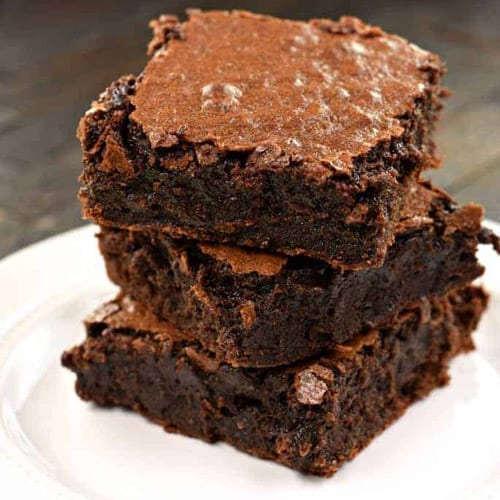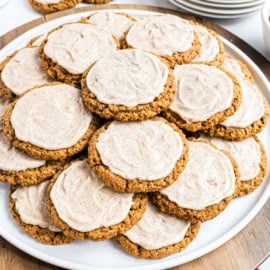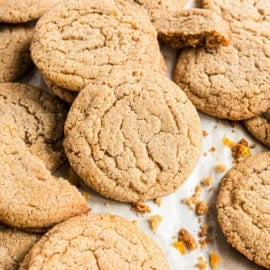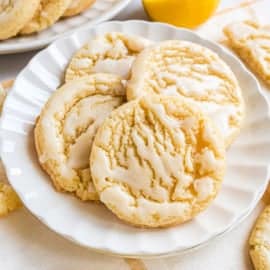Indulge in these Lemon Macarons with lemon curd filling. Zesty lemon flavor meets sweet macarons in this elegant and cheerful cookie! I’ll share tips and tricks to make this sweet magical macaron cookie.
I’ve been on a macaron kick lately! Use my guide for How to Make Macarons for macaron success every time. Our Strawberry Macarons are a huge hit for the holidays.

Why this Recipe Works
Not all macaron recipes are created equal. If you’ve made unsuccessful attempts at homemade macarons in the past, you’re not alone!
This recipe walks you through each and every step of make perfect lemon macarons. Need a few more reasons to try this recipe?
- No wasted egg yolks. If you make Homemade Lemon Curd for the filling, you can use the yolks you already separated from the egg whites in the meringue.
- Amazing lemon flavor. Using both lemon curd AND extra lemon zest in the filling gives these a bright fresh citrus taste. Nothing artificial tasting here!
- Perfect texture. The macarons have a crisp outer layer that yields to a soft and fluffy inside.
As a reminder, these french macarons are very different for our macaroons recipe! Those are coconut cookies made with egg whites as well.
Ingredient Notes


- Lemon curd. I love homemade lemon curd but store bought can be used if preferred.
- Almond flour. Use superfine almond flour (not to be confused with almond meal) in the macaron shells. This is our favorite brand on Amazon.
- Cream of tartar. This ingredient is optional but makes it much easier to whip the egg whites into stiff peaks.
- Powdered sugar. You can also use caster sugar if you prefer. If you ONLY have granulated sugar, pulse it in a blender or food process until fine in texture.
- Food coloring. To get the beautiful lemon hue, use a gel food coloring. Liquid food colorings require MORE, and they will destabilize the stiff peaks of egg whites.
- Fresh lemon. You’ll want to use fresh lemon zest in our filling!
Tips and Tricks

- Test macaronage. Before piping the macaron shells onto the baking sheet, use the “figure 8” trick to test the consistency of the macaronage. Trace a figure 8 with the batter after each fold. It should flow off the spatula in ribbons, like lava.
- Use a metal bowl. A cold metal bowl helps meringue stiffen.
- Soft vs. Stiff Peaks: A soft peak leans to the side and curls at the top. A stiff peak stands straight up with the peak pointing upwards.
- Check oven temperature. Most home ovens don’t have accurate temperature gauges. Investing in an oven thermometer helps guarantee you bake the macaron shells at the correct temperature.
- Sheet Pans. My number one trick for perfect macarons is to double up your sheet pans! I use USA Pans— good quality aluminum pans— and I double them to insulate the macarons and prevent the bottoms from becoming overheated (which could lead to browning and/or spreading).

Recipe FAQs
Soft egg white peaks will curl at the top. Stiff peaks should have a point that stands straight up and does not lean.
If your macaron shells are hollow after baking the culprit is usually overwhipped egg whites. Over beating breaks up some of the proteins in the egg white.
Avoid this by beating your meringue just until you see the first stiff peaks form.
If your macaron shells spread outward instead of rising upward as they bake, you may have under whipped your egg whites.
If your macarons tend to brown on top: Cover the top of the pan with aluminum foil half way through baking.
If the bottoms of your macarons are browning: Add another sheet pan underneath the first one. This insulates the bottom of the shells to prevent browning.
Lemon Macarons will taste best if you let them rest overnight before enjoying. They keep well in the refrigerator for up to 2 days.
Want even more tips and tricks for making homemade macarons? Don’t forget to read my complete step by step guide for mastering these delicately delicious French treats.
More Easy Cookie Recipes
Pin this now to find it later
Pin It
Lemon Curd Macarons Recipe
Ingredients
For the Shell
- 2 large egg whites
- ⅛ teaspoon cream of tartar optional, see notes
- ¼ cup granulated sugar
- 1 ¼ cups powdered sugar
- ¾ cup super fine almond flour
- Gel Food Coloring (optional, see notes)
For the Filling
- ½ cup unsalted butter softened
- 2 ¼ cups powdered sugar
- ¼ cup lemon curd divided
- 1 teaspoon pure vanilla extract
- ½ teaspoon lemon zest
Instructions
For the Shell
- Line two sheet pans with parchment paper or silpat mats.
- Add the egg whites to the bowl of a stand mixer fitted with the whisk attachment. Beat the egg whites on medium-high speed until they become foamy– about 30 seconds. If using cream of tartar, add it now.
- With the mixer on medium speed, add the sugar slowly allowing it to fully incorporate before adding the next batch. It should take 2-3 minutes to add all of the sugar.
- Once all of the sugar has been added, let the mixer run until the egg whites reach stiff peaks– about 2-3 more minutes.
- Use a fine mesh sieve to sift the powdered sugar and almond flour into the egg whites.
- Fold the dry ingredients gently into the egg whites by making a J shape with a rubber spatula.
- Once all of the dry ingredients have been incorporated, add gel food coloring, if using.
- Next, smush the batter against the sides of the bowl and fold it back together 4-5 times before testing if the meringue is at the figure 8 stage.
- The macarons are ready to pipe when you can draw an 8 with the meringue without the steam breaking. If the meringue
falls off in clumps, smush it a few more times before testing for the figure 8 again. - When the mixture flows smoothly, transfer it to a piping bag fitted with a round tip (I like a Wilton #10-12).
- Pipe 1.5” circles about 2” apart. Hold the tray 6” off the counter and drop it straight down onto the counter. Repeat 4-5 times, or until it looks like all of the air bubbles have popped.
- Set the macarons aside to rest for 25-30 minutes, or until they have developed a skin. When you touch them lightly, they shouldn’t stick to your finger. While the macarons rest, preheat your oven to 325F.
- Bake the macarons one tray at a time for 14 minutes, turning the pan half way through baking. Allow the macarons to cool fully on the tray to avoid sticking.
For the Filling
- Add the butter to the bowl of a stand mixer fitted with the paddle attachment. Beat on medium-high speed for 2-3 minutes, or until it’s light and airy. Make sure to scrape the sides of the bowl down a few times while it mixes.
- With the mixer on low speed, gradually add the powdered sugar. When the powdered sugar is all incorporated, add two tablespoons of lemon curd, the vanilla extract, and the lemon zest.
- Turn the mixer to high speed and beat until the icing is light and fluffy– about 3-4 minutes. Transfer to a piping bag (fitted with your choice of tip) and set aside until ready to use.
Assemble and Age
- Place the macarons in similar sized pairs. Pipe a ring of lemon buttercream around the edge of one macaron shell. Fill the center with lemon curd and then place another macaron shell on top. Press gently to seal them together. Repeat with the remaining macarons.
- Place the filled macarons in the fridge to age overnight. Bring them to room temperature and enjoy. Store in an airtight container in the fridge for up to three days.
Notes
- Test macaronage. Before piping the macaron shells onto the baking sheet, use the “figure 8” trick to test the consistency of the macaronage. Trace a figure 8 with the batter after each fold. It should flow off the spatula in ribbons, like lava.
- Use a metal bowl. A cold metal bowl helps meringue stiffen.
- Soft vs. Stiff Peaks: A soft peak leans to the side and curls at the top. A stiff peak stands straight up with the peak pointing upwards.
- Check oven temperature. Most home ovens don’t have accurate temperature gauges. Investing in an oven thermometer helps guarantee you bake the macaron shells at the correct temperature.
- Sheet Pans. My number one trick for perfect macarons is to double up your sheet pans! I use USA Pans— good quality aluminum pans— and I double them to insulate the macarons and prevent the bottoms from becoming overheated (which could lead to browning and/or spreading).





Your first note states that using a scale to weigh ingredients is key, but the recipe does not include the weights of the ingredients. Is there a recipes I’m not seeing that includes the ingredients by weight?
This is seruoisly good! My kids couldn’t stop eating these! I will definitely make it again!
This is seruoisly good! My kids couldn’t stop eating these! I will definitely make it again!
Lemon anything is my favorite but these were absolutely INCREDIBLE!! They also look pretty cute on my counter right now on my new cake stand! Thank you!
Thank you so much for sharing this amazing recipe! Will surely have this again! It’s really easy to make and it tasted so delicious! Highly recommended!